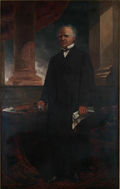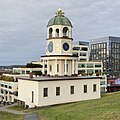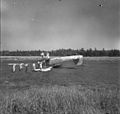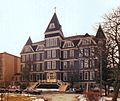User:MediaKyle/sandbox/portal
Introduction

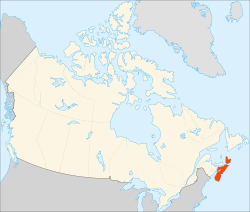
Nova Scotia is a province of Canada, located on its east coast. It is one of the three Maritime provinces and most populous province in Atlantic Canada, with an estimated population of over 1 million as of 2024; it is also the second-most densely populated province in Canada, and second-smallest province by area. The province comprises the Nova Scotia peninsula and Cape Breton Island, as well as 3,800 other coastal islands. The province is connected to the rest of Canada by the Isthmus of Chignecto, on which the province's land border with New Brunswick is located.
Nova Scotia's capital and largest municipality is Halifax, which is home to over 45% of the province's population as of the 2021 census. Halifax is the twelfth-largest census metropolitan area in Canada, the largest municipality in Atlantic Canada, and Canada's second-largest coastal municipality after Vancouver.
The land that makes up what is now Nova Scotia was inhabited by the Miꞌkmaq people at the time of European colonization. In 1605, Acadia—France's first New France colony—was founded with the creation of Acadia's capital, Port Royal. The Scots, English, then British, fought France for the territory on numerous occasions for over a century afterwards, having gained it from them in the 1713 Peace of Utrecht, which ended the War of the Spanish Succession. In subsequent years, the British began settling "foreign Protestants" in the region and deported the French-speaking Acadians en masse. During the American Revolutionary War (1775–1783), thousands of Loyalists settled in Nova Scotia. (Full article...)
Selected article -
The Expulsion of the Acadians was the forced removal of inhabitants of the North American region historically known as Acadia between 1755 and 1764 by Great Britain. It included the modern Canadian Maritime provinces of Nova Scotia, New Brunswick, and Prince Edward Island, along with part of the US state of Maine. The Expulsion occurred during the French and Indian War, the North American theatre of the Seven Years' War.
Prior to 1758, Acadians were deported to the Thirteen Colonies, then later transported to either Britain or France. Of an estimated 14,100 Acadians, approximately 11,500 were deported, of whom 5,000 died of disease, starvation or shipwrecks. Their land was given to settlers loyal to Britain, mostly immigrants from New England and Scotland. The event is largely regarded as a crime against humanity, though the modern-day use of the term "genocide" is debated by scholars. A census of 1764 indicates 2,600 Acadians remained in the colony, having eluded capture. (Full article...)
Images from Nova Scotia-related articles
Selected biography -

Margaret Sibella Brown (March 2, 1866 – November 16, 1961) was a Canadian amateur bryologist specializing in mosses and liverworts native to Nova Scotia. Early in her career she was involved with gathering supplies of sphagnum moss to be used as surgical dressings during World War I, when cotton was in short supply. After the war, she researched mosses from around the world, collecting specimens in Europe, the Caribbean, and the United States, as well as her native Canada. She published several papers in academic journals, some on materials she had collected herself and some cataloging samples collected by other investigators. Samples she collected are now housed at several major herbaria in North America and Europe.
Born into upper-class society, Brown was educated in Halifax, Stuttgart, and London. Although lacking formal scientific training, she has been recognized for her contributions to bryology and as an authority on the mosses and liverworts of Nova Scotia. At the age of 84, Brown was awarded an honorary M.A. degree from Acadia University after declining their offer of a Ph.D. She died at her home in Halifax in 1961 aged 95. In 2010, she was inducted into the Nova Scotia Scientific Hall of Fame. (Full article...)
Selected image
Related projects and portals
Topics
Categories
Things you can do
- Help expand stub articles: There are numerous stub articles relating to Nova Scotia. You can help by expanding them. See Nova Scotia stubs for a list.
- Add images: There are a number of articles relating to Nova Scotia which would be better with a photograph. You can help by finding an appropriately licensed image or creating your own. See requested photographs in Nova Scotia for a list.
Associated Wikimedia
The following Wikimedia Foundation sister projects provide more on this subject:
-
Commons
Free media repository -
Wikibooks
Free textbooks and manuals -
Wikidata
Free knowledge base -
Wikinews
Free-content news -
Wikiquote
Collection of quotations -
Wikisource
Free-content library -
Wikivoyage
Free travel guide -
Wiktionary
Dictionary and thesaurus




